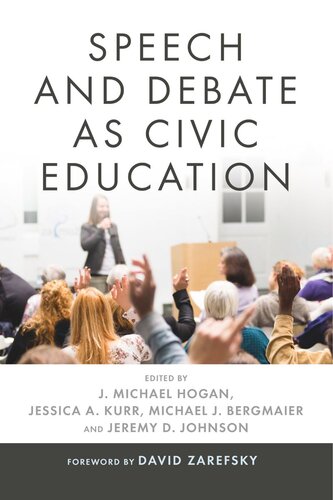

Most ebook files are in PDF format, so you can easily read them using various software such as Foxit Reader or directly on the Google Chrome browser.
Some ebook files are released by publishers in other formats such as .awz, .mobi, .epub, .fb2, etc. You may need to install specific software to read these formats on mobile/PC, such as Calibre.
Please read the tutorial at this link: https://ebookbell.com/faq
We offer FREE conversion to the popular formats you request; however, this may take some time. Therefore, right after payment, please email us, and we will try to provide the service as quickly as possible.
For some exceptional file formats or broken links (if any), please refrain from opening any disputes. Instead, email us first, and we will try to assist within a maximum of 6 hours.
EbookBell Team

0.0
0 reviewsIn an era increasingly marked by polarized and unproductive political debates, this volume makes the case for a renewed emphasis on teaching speech and debate, both in and outside of the classroom.
Speech and debate education leads students to better understand their First Amendment rights and the power of speaking. It teaches them to work together collaboratively to solve problems, and it encourages critical thinking, reasoned and fact-based argumentation, and respect for differing viewpoints in our increasingly diverse and global society. Highlighting the need for more emphasis on the ethics and skills of democratic deliberation, the contributors to this volume—leading scholars, teachers, and coaches in speech and debate programs around the country—offer new ideas for reinvigorating curricular and co-curricular speech and debate by recovering and reinventing their historical mission as civic education.
Combining historical case studies, theoretical reflections, and reports on programs that utilize rhetorical pedagogies to educate for citizenship, Speech and Debate as Civic Education is a first-of-its-kind collection of the best ideas for reinventing and revitalizing the civic mission of speech and debate for a new generation of students.
In addition to the editors, the contributors to this volume include Jenn Anderson, Michael D. Bartanen, Ann Crigler, Sara A. Mehltretter Drury, David A. Frank, G. Thomas Goodnight, Ronald Walter Greene, Taylor W. Hahn, Darrin Hicks, Edward A. Hinck, Jin Huang, Una Kimokeo-Goes, Rebecca A. Kuehl, Lorand Laskai, Tim Lewis, Robert S. Littlefield, Allan D. Louden, Paul E. Mabrey III, Jamie McKown, Gordon R. Mitchell, Catherine H. Palczewski, Angela G. Ray, Robert C. Rowland, Minhee Son, Sarah Stone Watt, Melissa Maxcy Wade, David Weeks, Carly S. Woods, and David Zarefsky.